Khulna University (KU) – Admission, Result, Notice, Fee & Facilities
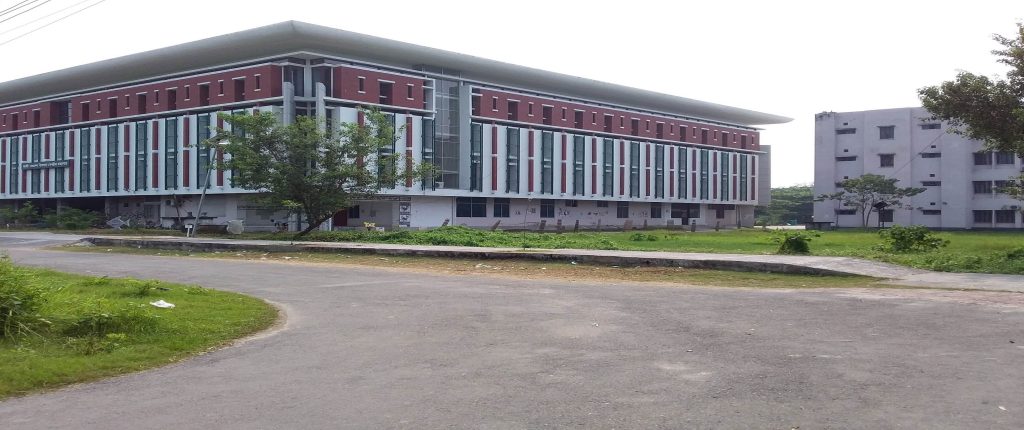
Khulna University Table of Contents Related Post Khulna University About Khulna University, established in 1991, is a renowned public university located in the southwestern region of Bangladesh. Known for its uninterrupted academic environment, the university operates free from political unrest, fostering an ideal atmosphere for learning and research. Situated along the scenic Mayur River, Khulna University boasts an eco-friendly campus with modern facilities. The university is organized into eight schools and 29 disciplines, offering diverse undergraduate and postgraduate programs in science, engineering, arts, business, and life sciences. It emphasizes research and innovation, contributing significantly to national development and global knowledge. Khulna University is committed to creating future-ready graduates with strong ethical and leadership qualities. It promotes a vibrant student life with clubs, extracurricular activities, and community engagement programs. Affordable tuition fees and various scholarships make it accessible to students from all backgrounds. Khulna University is a hub of excellence, blending academic rigor with a sustainable and inclusive vision. Basic Info Official Name – Khulna University Establish Year- 1991 Official Website Link – ku.ac.bd Official Facebook Link- Address- Khulna University, Khulna-9208, Bangladesh Khulna University Faculties, Departments, Courses, Duration, and Fees Khulna University, established in 1991, is one of the leading public universities in Bangladesh. It offers a wide range of academic programs across diverse disciplines, fostering a unique combination of quality education and research opportunities. Below is a comprehensive guide to its faculties, departments, courses, durations, and fees. Faculties and Departments School of Science, Engineering, and Technology (SET) Departments: Computer Science and Engineering (CSE) Electronics and Communication Engineering (ECE) Mathematics Physics Chemistry Statistics Focus: Science and technological advancement, fostering innovation in engineering and research. School of Life Science (SLS) Departments: Biotechnology and Genetic Engineering Environmental Science Fisheries and Marine Resources Technology Agrotechnology Forestry and Wood Technology Focus: Life sciences, environmental studies, and sustainable development. School of Management and Business Administration (MBA) Departments: Business Administration Focus: Business leadership, finance, marketing, and management principles. School of Arts and Humanities (SAH) Departments: Bangla English History and Civilization Focus: Cultural, linguistic, and historical studies. School of Social Science (SSS) Departments: Sociology Economics Development Studies Urban and Rural Planning (URP) Focus: Social, economic, and urban planning studies. School of Law Department: Law and Justice Focus: Legal studies, justice systems, and policy formulation. School of Fine Arts Departments: Drawing and Painting Focus: Creative expression and art education. Courses and Duration Undergraduate Programs: Degrees Offered: BSc, BA, BBA, LLB, BFA Duration: 4 years (8 semesters) Includes coursework, practical sessions, and project work. Postgraduate Programs: Degrees Offered: MSc, MA, MBA, LLM Duration: 1–2 years (2–4 semesters) Focuses on advanced specialization and research. MPhil and PhD Programs: Duration: Typically 3–5 years (research-based) Designed for in-depth research and academic contribution. Fee Structure Undergraduate Programs: Admission Fee: BDT 15,000 – 20,000 (one-time). Tuition Fees: Science and Engineering: BDT 6,000 – 8,000 per semester. Arts and Humanities: BDT 3,000 – 5,000 per semester. Additional Fees: Library, lab, and examination fees may apply, ranging from BDT 2,000 – 4,000 per semester. Postgraduate Programs: Admission Fee: BDT 20,000 – 25,000 (one-time). Tuition Fees: Science and Engineering: BDT 7,000 – 10,000 per semester. Arts and Business: BDT 5,000 – 7,000 per semester. MPhil/PhD Programs: Fees: Registration and research fees typically range between BDT 25,000 – 50,000 annually. Hostel Fees: Hostel accommodation is affordable, typically BDT 1,500 – 3,000 per semester, with additional utility costs. Facilities Academic Facilities: Modern classrooms, well-equipped laboratories, and a state-of-the-art library with access to digital resources. Accommodation: Separate hostels for male and female students with dining facilities. Technology Support: High-speed internet across campus and specialized computer labs. Health Services: On-campus medical center providing basic healthcare. Extracurricular Opportunities: Clubs for debate, sports, culture, and research, promoting holistic development. Eco-Friendly Campus: Green spaces and a pollution-free environment, enhancing the learning experience. Scholarships and Financial Aid Khulna University offers various scholarships to meritorious and financially disadvantaged students. Funding opportunities are available for research-based programs, including MPhil and PhD studies. Why Choose Khulna University? Politics-Free Environment: Ensures uninterrupted academic schedules. Diverse Disciplines: Offers a broad range of programs catering to different interests. Research-Oriented: Encourages innovation and problem-solving through research. Affordable Education: Provides quality education at a lower cost compared to many institutions. For detailed information, visit the official website of Khulna University (www.ku.ac.bd) or contact the admission office. Khulna University Admission Process Khulna University is known for its merit-based, transparent, and competitive admission process. Each year, thousands of students apply for admission to its diverse undergraduate and postgraduate programs. Here’s a detailed overview of the admission process: Undergraduate Admission Process Eligibility Criteria: Applicants must have passed the SSC (Secondary School Certificate) and HSC (Higher Secondary Certificate) or equivalent examinations. Minimum GPA Requirements (varies by unit): Combined GPA of 8.00 or above in SSC and HSC for most units. Science and Engineering disciplines may require a GPA of 8.50 or higher. A minimum of 3.50 in each SSC and HSC exam is mandatory. Subject-specific GPA requirements may apply for some disciplines (e.g., Mathematics and Physics for engineering programs). Admission Units: A Unit: Science, Engineering, and Technology (SET). B Unit: Arts, Humanities, and Social Science. C Unit: Management and Business Administration. D Unit: Life Science. Steps to Apply: Online Application: Visit the official website of Khulna University (www.ku.ac.bd). Fill in the application form and provide details like personal information, academic records, and chosen discipline. Upload required documents, including recent photographs and academic certificates. Application Fee: Pay the application fee (typically BDT 1,000-1,500) through mobile banking platforms like bKash, Rocket, or bank deposit. Admission Test: Appear for the admission test, conducted separately for each unit. The test evaluates candidates based on their chosen disciplines, with questions on subjects like Bangla, English, Math, Physics, Chemistry, Biology, and General Knowledge. Admission tests are typically held in November-December. Merit List Publication: Results are published on the university’s official website and notice boards. Candidates are selected based on their admission test scores and past academic performance. Final Admission: Selected candidates must complete the final admission process, which includes document verification, payment of
Shahjalal University of Science & Technology SUST – Admission, Result, Notice, Fee & Facilities
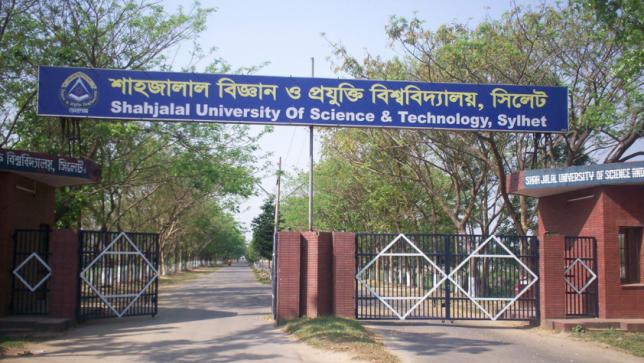
Shahjalal University of Science & Technology About Shahjalal University of Science & Technology (SUST) Shahjalal University of Science & Technology (SUST), located in Sylhet, Bangladesh, is a premier public institution known for its academic excellence and innovative approach to education. Established in 1986, SUST was the first university in Bangladesh to adopt the semester and credit hour system, setting a benchmark in higher education. The university is dedicated to fostering academic, technological, and research advancements across a broad range of disciplines. SUST offers undergraduate, postgraduate, and doctoral programs in science, engineering, technology, business, social sciences, and humanities. Its highly qualified faculty and state-of-the-art facilities, including advanced laboratories, libraries, and IT infrastructure, create an environment conducive to academic excellence and research. The university is committed to sustainability and interdisciplinary learning, preparing students to address real-world challenges. Beyond academics, SUST boasts a dynamic campus life enriched by cultural activities, sports, and student organizations. The lush green campus provides a peaceful and inspiring setting for learning and personal growth. Renowned for its research contributions, particularly in natural sciences and engineering, SUST plays a pivotal role in national and global development. Whether through its innovative teaching methods or its commitment to holistic education, SUST empowers students to achieve their potential and make meaningful contributions to society. Type Public University Science University Technology University Affiliated Colleges Table of Contents Official Name – Shahjalal University of Science & Technology Establish Year – 1986 Official Website link – www.sust.edu Official Facebook link – Address Shahjalal University of Science and Technology Kumargaon, Sylhet-3114, Bangladesh Shahjalal University of Science & Technology Courses, Duration, Fee Shahjalal University of Science & Technology (SUST) offers a wide range of undergraduate and postgraduate programs across various disciplines. Below is an overview of the available courses, their duration, and approximate fee structures. 1. Undergraduate Programs Faculty Departments Degree Duration Approx. Total Fee Faculty of Science Physics, Chemistry, Mathematics, Statistics, Geography & Environment BSc 4 years BDT 70,000 – 90,000 Faculty of Engineering Computer Science & Engineering (CSE), Electrical & Electronic Engineering (EEE), Civil Engineering BSc Engineering 4 years BDT 80,000 – 120,000 Faculty of Social Sciences Economics, Sociology, Political Studies, Public Administration BA/BSS 4 years BDT 60,000 – 80,000 Faculty of Business Studies Business Administration BBA 4 years BDT 75,000 – 100,000 Faculty of Life Sciences Biochemistry & Molecular Biology, Genetic Engineering & Biotechnology, Forestry BSc 4 years BDT 70,000 – 90,000 2. Postgraduate Programs Faculty Departments Degree Duration Approx. Total Fee Faculty of Science Physics, Chemistry, Mathematics, Statistics MSc 1–2 years BDT 25,000 – 50,000 Faculty of Engineering Computer Science & Engineering, Electrical & Electronic Engineering MSc Engineering 1–2 years BDT 30,000 – 60,000 Faculty of Social Sciences Economics, Sociology, Political Studies MA/MSS 1–2 years BDT 20,000 – 40,000 Faculty of Business Studies Business Administration MBA 1–2 years BDT 40,000 – 80,000 Faculty of Life Sciences Biochemistry & Molecular Biology, Genetic Engineering & Biotechnology MSc 1–2 years BDT 30,000 – 50,000 3. Doctoral Programs Degree: PhD in various disciplines. Duration: 3–5 years. Approx. Fee: BDT 50,000 – 1,00,000 (varies based on research field). Special Features Scholarships and Financial Aid: SUST offers merit-based and need-based scholarships to eligible students. Flexible Payment Options: Students can pay tuition fees in installments as per university policy. Fee Variability: Fees may vary for international students or self-financed programs. For the most accurate and updated information regarding fees and programs, visit the official SUST website: www.sust.edu. Shahjalal University of Science & Technology (SUST) Faculty and Department Shahjalal University of Science & Technology (SUST) is known for its diverse academic offerings across multiple faculties. Below is an overview of its faculties and the departments under each. 1. Faculty of Science This faculty focuses on fundamental sciences and offers a blend of theoretical and applied research. Departments: Physics Chemistry Mathematics Statistics Geography & Environment 2. Faculty of Engineering The Faculty of Engineering is a leader in technological education and research. Departments: Computer Science & Engineering (CSE) Electrical & Electronic Engineering (EEE) Civil & Environmental Engineering 3. Faculty of Life Sciences Dedicated to biological sciences and sustainable development. Departments: Biochemistry & Molecular Biology Genetic Engineering & Biotechnology Forestry & Environmental Science 4. Faculty of Business Studies Designed to develop business leaders and managers with a global perspective. Departments: Business Administration 5. Faculty of Social Sciences This faculty emphasizes understanding social dynamics and governance. Departments: Economics Sociology Political Studies Public Administration 6. Faculty of Arts and Humanities Fosters creativity and critical thinking through arts and cultural studies. Departments: Bangla English 7. Faculty of Physical Sciences This faculty specializes in modern scientific exploration and application. Departments: Industrial & Production Engineering (IPE) Petroleum & Mining Engineering (PME) Architecture 8. Faculty of Health Sciences Focused on healthcare education and medical sciences. Departments: Biomedical Engineering Specialized Research Centers In addition to traditional faculties, SUST also hosts research centers and institutes focusing on interdisciplinary studies, including: Institute of Information and Communication Technology (IICT) Center for Research, Testing, and Consultancy SUST’s faculties and departments are designed to address the needs of modern education while fostering research, innovation, and professional excellence. Shahjalal University of Science & Technology (SUST) Admission Process The admission process at Shahjalal University of Science & Technology (SUST) is designed to ensure transparency and fairness while selecting deserving students. The university admits students into undergraduate, postgraduate, and doctoral programs through a structured process. Below are the detailed steps for admission. 1. Undergraduate Admission Process The undergraduate admission process at SUST is competitive, with students selected based on academic merit and admission test performance. Eligibility Criteria: Academic Requirements: Candidates must have completed HSC (Higher Secondary Certificate) or equivalent in the current or previous year. A minimum GPA of 4.00 in both SSC and HSC (or equivalent), with specific GPA requirements in core subjects like Mathematics, Physics, Chemistry, and English, depending on the program. Subject Group: Applicants must apply based on their background (Science, Arts, or Commerce) in line with program prerequisites. Application Steps: Online Application: Visit the official SUST admission portal (admission.sust.edu). Fill out the application form,
Islamic University (IU) – Admission, Result, Notice, Fee & Facilities
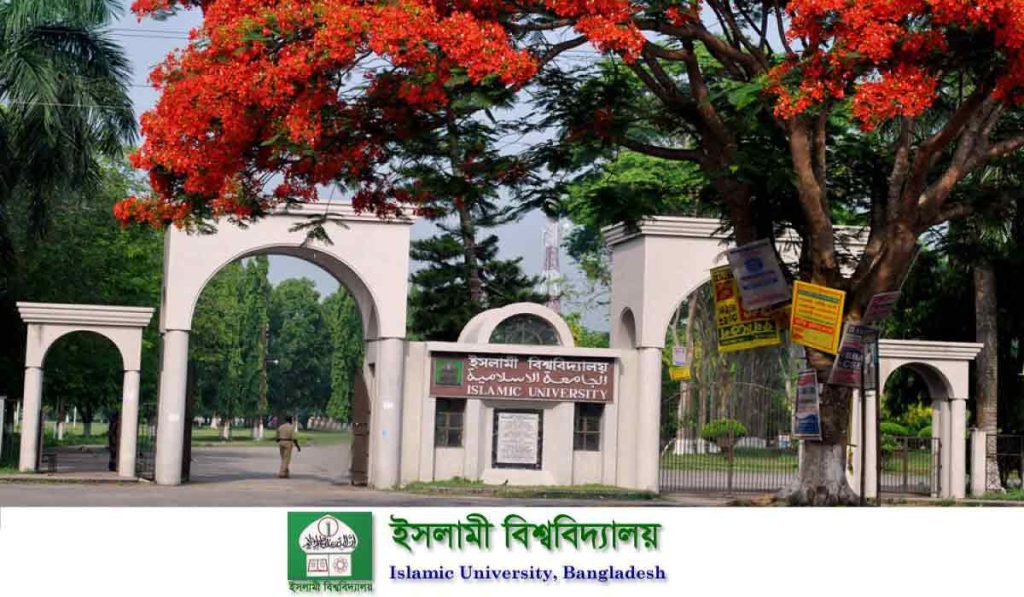
Islamic University (IU) Table of Contents Related Post Islamic University About The Islamic University (IU), Bangladesh, established in 1985, is one of the premier public universities in the country. Located in Kushtia, it serves as a hub for Islamic education and modern academic disciplines, embodying a unique blend of religious and secular studies. IU was founded with the aim of promoting higher education in Islamic theology, law, and research while also offering programs in sciences, engineering, business, arts, and social sciences. IU operates under the supervision of the government of Bangladesh, with a vision to foster academic excellence, ethical values, and leadership qualities in students. Its curriculum integrates Islamic values with contemporary knowledge, preparing graduates to meet global challenges while adhering to moral principles. The university boasts a sprawling campus, modern facilities, and a vibrant student life. It attracts students nationwide and is renowned for contributing significantly to the intellectual and cultural growth of Bangladesh. Basic Info Official Name – Islamic University Establish Year- 1985 Official Website Link – www.iu.ac.bd Official Facebook Link- Address- Islamic University, Kushtia, Bangladesh Islamic University Faculties, Departments, Courses, Duration, and Fees Islamic University (IU), Bangladesh offers a wide range of academic programs through various faculties and departments. Here’s a breakdown of the university’s faculties, departments, courses, duration, and fees: Faculties and Departments: Faculty of Theology and Islamic Studies: Departments: Islamic Studies Shariah and Islamic Law Hadith and Islamic Studies Focuses on Islamic theology, law, and jurisprudence. Faculty of Arts and Humanities: Departments: Bangla English History Philosophy Arabic Islamic History and Culture Offers courses in humanities, social sciences, and languages. Faculty of Business Administration: Departments: Management Accounting Finance Marketing Economics Provides programs related to business and management. Faculty of Social Sciences: Departments: Sociology Political Science Anthropology Public Administration Focuses on social sciences and public policy. Faculty of Science and Engineering: Departments: Computer Science & Engineering Electrical and Electronic Engineering Mathematics Physics Chemistry Biochemistry and Biotechnology Offers programs in various scientific and engineering fields. Faculty of Law: Departments: Law Shariah Law Provides courses in law, focusing on both Islamic law and modern legal practices. Faculty of Fine Arts: Departments: Fine Arts Music Drama Focuses on creative and performing arts. Courses and Duration: Undergraduate Programs: Typically 4 years (8 semesters). Example programs: BA (Honors) in Islamic Studies, BBA in Business Administration, BSc in Computer Science, LLB in Law, etc. Postgraduate Programs: Typically 1-2 years. Example programs: MA in Islamic Studies, MBA in Business Administration, MSc in Physics, etc. MPhil/PhD Programs: Duration varies (typically 3-5 years). Available in many disciplines, including Islamic studies, law, science, and social sciences. Fees: Fees at Islamic University, Bangladesh can vary depending on the program and the student’s residency status. However, some general estimates are as follows: Undergraduate Programs: Tuition fees: Approx. BDT 10,000 to 20,000 per semester (varies by department). Additional fees for registration, library, lab, etc. Postgraduate Programs: Tuition fees: Approx. BDT 15,000 to 30,000 per semester. PhD/MPhil Programs: Fees for research-based programs vary, typically ranging from BDT 25,000 to 50,000 per semester. Note: The fees can be subject to change and may vary based on specific departments and programs. It is always recommended to check the official website or contact the university for the most up-to-date information on tuition fees. Scholarships: Islamic University offers scholarships for meritorious and economically disadvantaged students, and also provides a range of financial assistance options for students in need. If you need more specific details about a particular department, course, or fee structure, feel free to ask! Islamic University Admission Process The admission process for Islamic University (IU), Bangladesh, is competitive and designed to evaluate students based on academic merit and entrance exam performance. Here’s an overview of the admission process: Eligibility Criteria: Undergraduate Programs: Must have passed SSC (Secondary School Certificate) and HSC (Higher Secondary Certificate) or equivalent examinations. A minimum GPA requirement, generally: SSC: 3.00 out of 5.00 HSC: 3.00 out of 5.00 Total GPA in SSC and HSC: 7.00 or above (may vary by faculty). Some faculties/departments (like Engineering) may have additional subject-specific requirements (e.g., minimum grades in Math, Physics, Chemistry). Postgraduate Programs: For Master’s programs: A bachelor’s degree in a relevant field with a minimum CGPA (usually 2.5 or above on a 4.0 scale). For MPhil/PhD programs: A Master’s degree with a strong academic record. Admission Process: Application Submission: Applications are typically submitted online through the official university admission portal. Applicants must fill in personal, academic, and program-related information. Upload scanned copies of required documents, including: Academic transcripts and certificates. Recent passport-sized photographs. National ID card or birth certificate (if applicable). Application Fee: Pay the non-refundable application fee (typically around BDT 1,000-1,500) via mobile banking, bank transfer, or other approved methods. Entrance Examination: Applicants must sit for an admission test, usually divided into subject groups: A Unit: Theology and Islamic Studies. B Unit: Arts, Humanities, and Social Sciences. C Unit: Business Administration. D Unit: Science, Engineering, and Technology. The test evaluates subjects like English, General Knowledge, Bangla, and relevant subjects based on the chosen faculty. Merit List: Based on admission test scores and academic results, a merit list is published on the university website. Some programs may also have a viva-voce (oral interview) as part of the selection process. Final Admission: Selected candidates must complete the final admission process by submitting: Original academic documents for verification. Payment of admission and registration fees. Important Notes: Admission notices are typically published on the university’s official website and in major newspapers. Quota systems (e.g., for freedom fighters’ children, indigenous students) may apply. Key Dates: Admission process usually begins after HSC results are published (around October-November). Entrance exams are conducted in November-December. Classes typically start in January-February. For the most accurate and detailed information, visit the Islamic University official website or contact the university’s admission office. Islamic University Campus Facilities Library Laboratories Hostel Computer Lab Auditorium Play Ground Medical Cultural Green Environment Transport Key Points Islamic University Admission FAQs Islamic University Admission
Jahangirnagar University
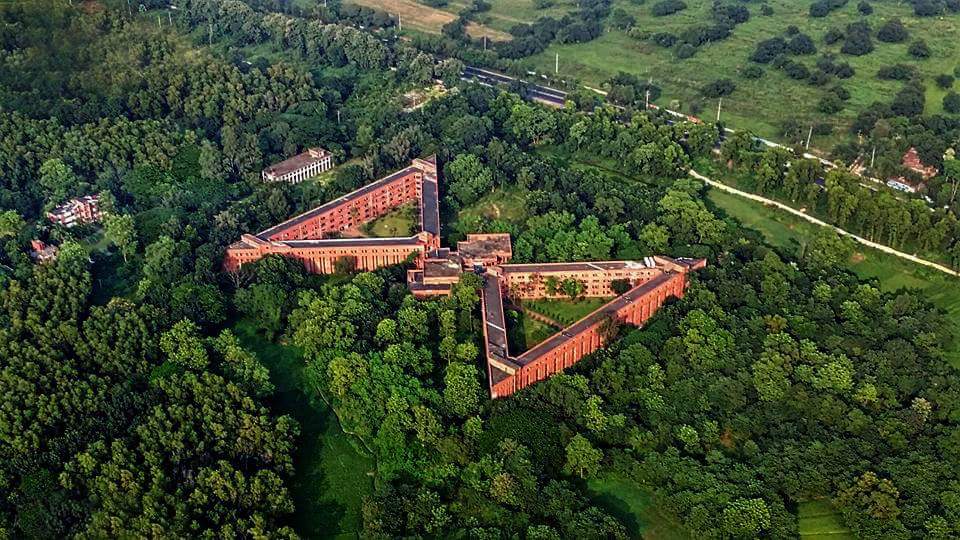
Jahangirnagar University About Jahangirnagar University Jahangirnagar University (JU), located in Savar, Dhaka, is one of Bangladesh’s leading public universities, renowned for its academic excellence and natural beauty. Established in 1970, the university operates as a fully residential institution, accommodating students in its scenic campus surrounded by lush greenery, serene lakes, and vibrant wildlife. JU offers diverse programs through its faculties, including Arts, Sciences, Social Sciences, Business Studies, and Law, fostering interdisciplinary learning and research. The campus is celebrated for its peaceful environment, making it a hub for cultural and academic activities. Notable for its strong emphasis on research, JU contributes significantly to fields like environmental science, physics, and literature. Its student-centric approach encourages extracurricular involvement, with vibrant clubs and organizations promoting creativity and leadership. Jahangirnagar University’s unique blend of academic rigor and natural charm makes it a cherished institution in Bangladesh’s higher education landscape. Basic Info Official Name – Jahangirnagar University Establish Year – 1970 Official Website Link – juniv.edu Official Facebook Link- Address – Jahangirnagar University, Savar, Dhaka-1342, Bangladesh. Jahangirnagar University University Faculties and Departments Here’s a table representing the faculties and departments of Jahangirnagar University: Faculty Departments Faculty of Arts and Humanities Bangla, English, History, Philosophy, Archaeology, Drama and Dramatics, International Relations, Journalism and Media Studies Faculty of Social Sciences Anthropology, Economics, Government and Politics, Geography and Environment, Public Administration, Sociology, Urban and Regional Planning Faculty of Mathematical and Physical Sciences Computer Science and Engineering, Environmental Sciences, Mathematics, Physics, Statistics Faculty of Biological Sciences Biochemistry and Molecular Biology, Botany, Zoology, Microbiology, Biotechnology and Genetic Engineering, Public Health and Informatics Faculty of Business Studies Accounting and Information Systems, Finance and Banking, Marketing, Management Studies Faculty of Law Law and Justice Faculty of Engineering and Technology Computer Science and Engineering Institute of Information Technology (IIT) Focuses on IT-related education and research. This table organizes the faculties and their corresponding departments for clarity. University Courses, Duration and Fees Here’s an overview of the courses, duration, and approximate fees offered at Jahangirnagar University (JU). Note that fees can vary depending on the program and other factors like residency status. Level Courses Duration Approximate Fees (BDT) Undergraduate Bachelor’s in Arts, Science, Social Sciences, Business Studies, Law, Engineering 4 years 20,000 – 50,000 per year Postgraduate Master’s in Arts, Science, Social Sciences, Business Studies, Law, Engineering 1-2 years 25,000 – 60,000 per year PhD Programs Research-based courses in various disciplines 3-5 years 50,000 – 100,000 (total) Diploma Programs Specialized professional and IT-related diplomas 6 months – 1 year 15,000 – 30,000 (total) Evening MBA Master of Business Administration (Evening) 2 years 1,00,000 – 1,50,000 (total) Key Notes: Undergraduate Programs: Cover various disciplines, requiring students to complete core, elective, and major-specific courses. Admission fees may include additional charges for residential facilities. Postgraduate Programs: Focus on advanced coursework and research. Some programs require thesis submission. PhD Programs: Emphasize independent research under faculty supervision. Evening MBA: Designed for professionals, offering flexible schedules and market-relevant skills. Diploma Programs: Short-term programs focused on specific skills or knowledge areas. Fees are affordable compared to international standards and vary slightly by department. Scholarships and financial aid are available for deserving students. University Admission Process Here’s a table summarizing the admission process at Jahangirnagar University (JU): Step Details 1. Admission Announcement Circular published annually (typically August-October for undergraduate programs). 2. Eligibility Criteria – Undergraduate: HSC & SSC with required GPA (usually 8.00+ combined). – Postgraduate: Relevant undergraduate degree with specified CGPA. – PhD: Master’s with a thesis and research proposal. 3. Online Application – Apply via JU Admission Portal. – Upload documents and pay fees (BDT 700–1200) via mobile banking services. 4. Admission Test – Faculty-based tests (e.g., Science, Arts, Business). – Subjects vary by faculty (e.g., Math, Physics for Science; Bangla, English for Arts). – Negative marking applies in some cases. 5. Merit List and Selection – Results published online and on notice boards. – Seats allocated based on test scores and merit ranking. 6. Admission Confirmation – Verify documents, pay admission fees, and confirm enrollment within the given timeframe. 7. Special Notes – Quota System: Reserved seats for freedom fighter families, minorities, and disabled students. – Residential Halls: Mandatory on-campus residency for all students. This table provides a clear, concise overview of JU’s admission process. University Campus Facilities Library Laboratories Hostel Computer Lab Auditorium Play Ground Medical Cultural Green Environment Transport Key Points University Admission FAQs University Admission Item #1 Table of Contents Related Post Advertise
Chittagong University
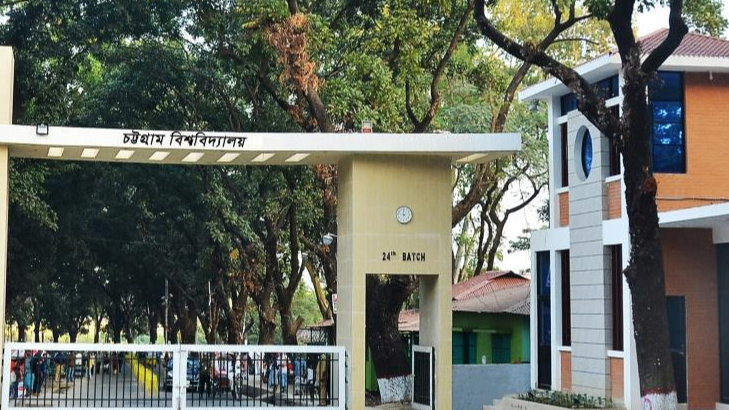
University of Chittagong About Chittagong University Chittagong University (CU), located in Hathazari, Chittagong, is one of Bangladesh’s most prestigious public universities. Established in 1966, CU has earned a reputation for academic excellence, research innovation, and a vibrant campus life. Spread across a sprawling, picturesque campus surrounded by hills and greenery, it provides a serene and inspiring environment for learning. CU offers a diverse range of undergraduate, postgraduate, and doctoral programs across faculties such as science, arts, social sciences, business administration, law, and engineering. The university is home to state-of-the-art facilities, including modern laboratories, a central library, and well-equipped classrooms. With a strong emphasis on research and interdisciplinary learning, CU promotes innovation and critical thinking among its students. The university also provides residential facilities, sports amenities, and extracurricular opportunities, fostering personal and professional growth. Chittagong University continues to shape future leaders, making it a center of excellence in higher education in Bangladesh. Basic Info Official Name – University of Chittagong Establish Year – 1966 Official Website Link – web.cu.ac.bd Official Facebook Link- Address – Chittagong University Rd, Chittagong 4331 Chittagong University Logo Chittagong University Admission Process The University of Chittagong (CU) has outlined its admission process for the academic year 2024-2025. Below is a table summarizing the key details: Admission Component Details Application Period – Start Date: November 2024– End Date: December 2024 Admission Test Dates – Start Date: March 1, 2025– End Date: March 22, 2025 Application Process – Step 1: Visit the official CU admission portal: admission.cu.ac.bd– Step 2: Click on the “Apply Now” button and fill in the required personal and academic information.– Step 3: Upload necessary documents, such as recent passport-sized photographs and academic certificates.– Step 4: Pay the application fee through the designated payment methods.– Step 5: Submit the application and print the confirmation page for future reference. Eligibility Criteria – Undergraduate Programs:– Successful completion of Higher Secondary Certificate (HSC) or equivalent examination.– Minimum GPA requirements vary by department; refer to the official admission circular for specifics.– Postgraduate Programs:– Relevant bachelor’s degree with a minimum required GPA.– Additional requirements may apply; consult the specific department’s guidelines. Required Documents – Recent passport-sized photographs.– Academic transcripts and certificates.– National ID card or birth certificate.– Other documents as specified in the admission guidelines. Contact Information – Admission Hotline:– Email: admission@cu.ac.bd– Working Hours: 9:00 AM – 9:00 PM– Location: ICT Cell, IT Building, University of Chittagong For the most accurate and up-to-date information, please refer to the official CU admission portal or contact the admissions office directly. Chittagong University Faculties and Departments Here’s a table summarizing the faculties and departments at the University of Chittagong (CU): Faculty Departments Faculty of Arts and Humanities – Arabic – Bangla – Communication and Journalism – Dramatics – English – History – Islamic History and Culture – Islamic Studies – Linguistics – Oriental Languages – Pali and Buddhist Studies – Philosophy – Sanskrit – Fine Arts Faculty of Science – Physics – Chemistry – Mathematics – Statistics – Applied Chemistry and Chemical Engineering Faculty of Biological Sciences – Biochemistry and Molecular Biology – Botany – Zoology – Microbiology – Genetic Engineering and Biotechnology – Soil Science – Environmental Science – Psychology – Geography and Environmental Studies Faculty of Social Sciences – Economics – Political Science – Sociology – Public Administration – Anthropology – International Relations – Development Studies – Criminology and Police Science – Women and Gender Studies – Peace and Conflict Studies Faculty of Business Administration – Accounting – Management – Finance – Marketing – Human Resource Management – Banking and Insurance Faculty of Law – Law Faculty of Engineering – Computer Science and Engineering – Electrical and Electronic Engineering Faculty of Marine Sciences and Fisheries – Marine Bioresource Science – Oceanography Faculty of Education – Education Faculty of Medicine – Affiliated Medical Colleges: Chittagong Medical College Comilla Medical College Cox’s Bazar Medical College Rangamati Medical College Chandpur Medical College This structured table provides an overview of the academic structure at the University of Chittagong. For more information, visit the official CU website. Chittagong University Courses, Duration and Fees The University of Chittagong (CU) offers a variety of undergraduate and postgraduate programs across multiple disciplines. Below is a table summarizing some of the key programs, their durations, and approximate tuition fees: Program Duration Approximate Tuition Fees Bachelor of Science in Computer Science and Engineering (CSE) 4 years – Local Students:– Approximately BDT 8,000 per year- Total: BDT 32,000 for the entire program- International Students:– Approximately USD 1,000 per year– Total: USD 4,000 for the entire program Bachelor of Business Administration (BBA) 4 years – Local Students:– Approximately BDT 8,000 per year– Total: BDT 32,000 for the entire program– International Students:– Approximately USD 1,000 per year- Total: USD 4,000 for the entire program Bachelor of Laws (LL.B.) 4 years – Local Students:– Approximately BDT 8,000 per year– Total: BDT 32,000 for the entire program– International Students:– Approximately USD 1,000 per year– Total: USD 4,000 for the entire program Master of Business Administration (MBA) 2 years – Local Students:– Admission Fee: BDT 10,000- Tuition Fee per Course: BDT 9,000– Total: Approximately BDT 135,000 for 3 semesters or BDT 180,000 for 4 semesters– International Students:– Approximately USD 1,000 per year– Total: USD 2,000 for the entire program Master of Arts (M.A.) 1-2 years – Local Students:– Approximately BDT 8,000 per year- Total: BDT 8,000 – 16,000 depending on program length- International Students: -Approximately USD 1,000 per year– Total: USD 1,000 – 2,000 depending on program length Additional Notes: Local Students: Tuition fees are highly subsidized, making education at CU affordable for Bangladeshi citizens. International Students: Tuition fees are significantly higher for foreign nationals. For instance, pursuing a bachelor’s degree requires sufficient financial solvency, with a total of USD 500 charged as tuition per year and an additional USD 100 for registration and other charges. Variations by Program: Specific programs, especially professional degrees like MBBS, may have different fee structures. For example, the MBBS program is listed with a duration of 6 years and a tuition
Bangladesh University of Engineering & Technology (BUET) | buet.ac.bd
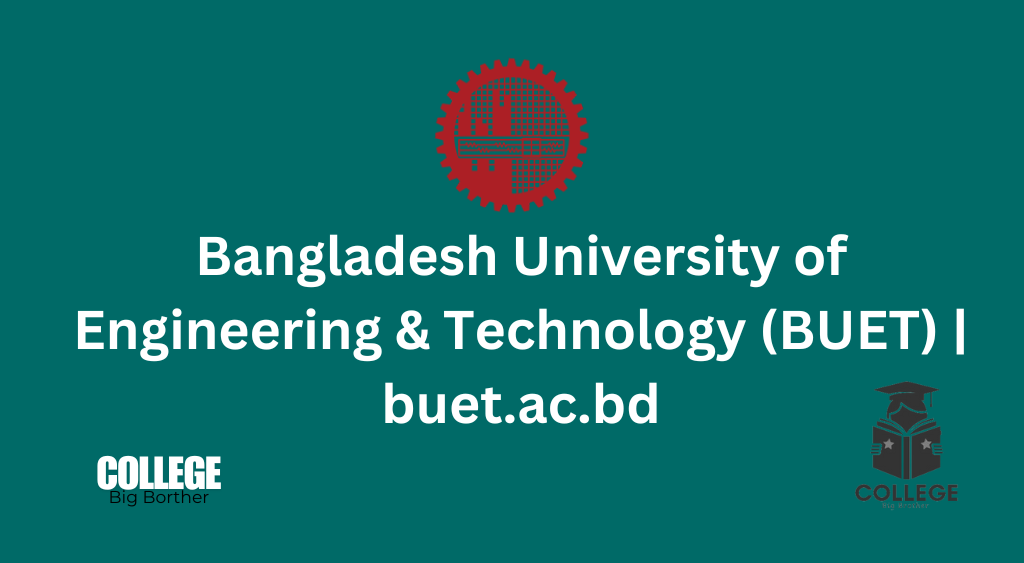
Bangladesh University of Engineering & Technology (BUET): The Pinnacle of Engineering Education in Bangladesh Basic Information Full Name: Bangladesh University of Engineering and Technology (BUET) Established: 1912 Type: Public University Location: Dhaka, Bangladesh Affiliation: University Grants Commission of Bangladesh (UGC) Motto: “Excellence in Engineering Education and Research” Website: www.buet.ac.bd Table of Contents History and Legacy of BUET Established in 1912 as the Dhaka Survey School, BUET has undergone several transformations before achieving its current status in 1962. It has played a crucial role in the development of Bangladesh by supplying top-tier professionals to the country’s industries, academia, and government sectors. As the leading engineering university in Bangladesh, BUET has consistently upheld its reputation by maintaining rigorous academic standards, fostering groundbreaking research, and cultivating a culture of excellence. Academic Excellence at BUET BUET offers undergraduate and postgraduate programs in various engineering and architecture disciplines. Its highly selective admission process ensures that only the brightest students gain entry. The academic programs at BUET are structured into the following faculties: Faculties and Departments Faculty of Civil Engineering Department of Civil Engineering Department of Water Resources Engineering Faculty of Electrical and Electronic Engineering Department of Electrical and Electronic Engineering Department of Computer Science and Engineering Faculty of Mechanical Engineering Department of Mechanical Engineering Department of Industrial and Production Engineering Department of Naval Architecture and Marine Engineering Faculty of Architecture and Planning Department of Architecture Department of Urban and Regional Planning Faculty of Engineering Department of Chemical Engineering Department of Materials and Metallurgical Engineering Department of Biomedical Engineering Department of Petroleum and Mineral Resources Engineering These faculties offer B.Sc., M.Sc., M.Phil., and Ph.D. programs, ensuring students receive comprehensive education and research opportunities. Admission Process and Requirements BUET has one of the most competitive admission processes in Bangladesh, admitting only the top students from across the country. The admission process consists of: Eligibility Criteria: Students must have excellent academic records in SSC and HSC, particularly in science subjects. Admission Test: The BUET admission test is one of the toughest exams, assessing students’ knowledge in Mathematics, Physics, and Chemistry. Final Selection: Based on test scores and academic performance, the top-ranked students are admitted. Due to its reputation, thousands of students apply every year, but only a few hundred secure a place. Research and Innovation at BUET BUET is known for its cutting-edge research in engineering and technology. The university houses multiple research centers focusing on emerging fields such as: Artificial Intelligence and Machine Learning Renewable Energy and Environmental Engineering Structural Engineering and Earthquake Resilience Robotics and Automation Water Resource Management BUET collaborates with national and international institutions to contribute to global advancements in engineering and technology. Facilities and Campus Life BUET provides state-of-the-art facilities to ensure a top-tier learning environment: Libraries: BUET has a well-stocked library with thousands of books, research journals, and digital resources. Laboratories: Advanced labs equipped with the latest technology for hands-on learning. Hostels: Several residential halls for students, ensuring a comfortable campus life. Sports and Extracurricular Activities: BUET has a strong tradition in athletics, debating, and cultural activities. IT and Innovation Centers: Cutting-edge computing labs and innovation hubs for research and startups. Notable Alumni of BUET BUET alumni have significantly contributed to Bangladesh and beyond. Many have taken leadership roles in top global tech companies, academia, and government sectors. Some notable alumni include: Fazlur Rahman Khan: Renowned structural engineer, known for designing the Sears Tower and John Hancock Center. Dr. Jamilur Reza Choudhury: Eminent civil engineer and educator. Dr. M. A. Rashid: Founding Vice-Chancellor of BUET. These individuals have left a lasting impact on the world through their contributions to engineering and technology. FAQs about BUET Q1. Where is BUET located? Ans: BUET is located in Dhaka, Bangladesh, near the Shahbagh and Palashi areas. Q2. How can I apply for BUET admission? Ans: Students must apply online and appear for the BUET admission test, which assesses knowledge in science subjects. Q3. What programs does BUET offer? Ans: BUET offers undergraduate, postgraduate, and doctoral programs in various engineering and architecture disciplines. Q4. Does BUET provide scholarships? Ans: Yes, BUET offers merit-based and need-based scholarships for outstanding and financially disadvantaged students. Q5. What are the job prospects for BUET graduates? Ans: BUET graduates are highly sought after in Bangladesh and abroad, with many securing positions in top multinational corporations, government agencies, and research institutions. Q6. Does BUET have hostel facilities? Ans: Yes, BUET provides residential halls for both male and female students. Q7. What are the major research areas at BUET? Ans: BUET conducts research in AI, renewable energy, robotics, structural engineering, and water resource management. Q8. How competitive is BUET admission? Ans: BUET has an extremely competitive admission process, with only a small percentage of applicants securing a place each year. Ans: BUET is located in Dhaka, Bangladesh, near the Shahbagh and Palashi areas. Ans: Students must apply online and appear for the BUET admission test, which assesses knowledge in science subjects. Ans: BUET offers undergraduate, postgraduate, and doctoral programs in various engineering and architecture disciplines. Ans: Yes, BUET offers merit-based and need-based scholarships for outstanding and financially disadvantaged students. Ans: BUET graduates are highly sought after in Bangladesh and abroad, with many securing positions in top multinational corporations, government agencies, and research institutions. Ans: Yes, BUET provides residential halls for both male and female students. Ans: BUET conducts research in AI, renewable energy, robotics, structural engineering, and water resource management. Ans: BUET has an extremely competitive admission process, with only a small percentage of applicants securing a place each year. Conclusion Bangladesh University of Engineering and Technology (BUET) stands as a beacon of academic excellence, technological innovation, and leadership. With its rigorous academic curriculum, exceptional faculty, and outstanding alumni network, BUET continues to shape the future of engineering and technology in Bangladesh and beyond. For aspiring engineers and technologists, BUET offers an unparalleled platform to learn, innovate, and excel in their careers. Whether you dream of becoming a researcher, industry leader, or entrepreneur, BUET provides the foundation to achieve your ambitions. Related
Bangladesh Agricultural University (BAU) | bau.edu.bd

About Bangladesh Agricultural University Bangladesh Agricultural University (BAU), established in 1961, is a premier institution dedicated to advancing agricultural education, research, and development in Bangladesh. Located in Mymensingh, it is renowned for its contributions to the agricultural and rural development sectors. BAU offers undergraduate, postgraduate, and doctoral programs across diverse fields such as crop science, animal husbandry, veterinary science, agricultural economics, and fisheries. The university features modern facilities, including well-equipped laboratories, research farms, and an expansive library, fostering an environment for innovation and excellence. It is a hub for groundbreaking research in agriculture and allied sciences, addressing challenges like food security, climate change, and sustainable farming practices. BAU actively collaborates with national and international organizations, promoting knowledge exchange and advanced research. Its alumni have significantly contributed to national agricultural policies and practices, making BAU a vital institution in ensuring the nation’s agricultural progress and sustainability. Table of Contents Basic Info Official Name – Bangladesh Agricultural University Establish Year – 1961 Official Website Link – bau.edu.bd Official Facebook Link- Address – Bangladesh Agricultural University, Mymensingh – 2202, Bangladesh. Bangladesh Agricultural University Admission Process Here is the Bangladesh Agricultural University (BAU) Admission Process: Step Details 1. Admission Circular – Admission notices are published on the BAU official website and in leading newspapers. 2. Eligibility Criteria – Academic Requirements: – SSC and HSC (or equivalent) with Science background. – Minimum combined GPA of 9.00 (SSC + HSC). – Minimum GPA 4.0 in Biology, Chemistry, Physics, and Mathematics at HSC level. 3. Online Application – Apply via the Bangladesh Agricultural University Admission Portal. – Upload required documents: academic certificates, transcripts, recent passport-sized photo, and NID/Birth Certificate. – Pay the application fee (typically 1,000 – 1,200 BDT) through online/mobile banking. 4. Admission Test – Candidates must appear for a written admission test based on Biology, Chemistry, Physics, and Mathematics. – Total marks: 100. 5. Merit List Publication – Merit lists are prepared based on admission test scores and academic performance. – Separate lists are published for quota categories (freedom fighters’ children, tribal students, etc.). 6. Document Verification – Shortlisted candidates must submit original SSC and HSC certificates, mark sheets, and photos for verification. 7. Admission Confirmation – Pay the admission fee (approximately 5,000 – 10,000 BDT) to confirm enrollment. – Receive student ID and other relevant materials. 8. Orientation and Class Start – Participate in an orientation program to understand academic rules and university facilities. Classes commence as per the academic calendar. Key Notes: Quota System: Special quotas are available for freedom fighters’ children, tribal students, and others as per government policies. Scholarships and Financial Aid: Merit-based and need-based scholarships are available for deserving students. International Students: Must apply through the Ministry of Education. Higher tuition fees may apply. For accurate details and updates, visit the official BAU website. Bangladesh Agricultural University Faculties and Departments Here is the list of Faculties and Departments at Bangladesh Agricultural University (BAU): Faculty Departments Faculty of Agriculture – Agronomy – Soil Science – Entomology – Plant Pathology – Horticulture – Crop Botany – Genetics and Plant Breeding – Agricultural Extension Education – Agricultural Chemistry Faculty of Animal Husbandry – Animal Science – Animal Breeding and Genetics – Animal Nutrition – Dairy Science – Poultry Science Faculty of Veterinary Science – Anatomy and Histology – Microbiology and Hygiene – Pathology – Pharmacology – Physiology – Surgery and Obstetrics – Medicine – Parasitology – Public Health and Epidemiology Faculty of Agricultural Economics & Rural Sociology – Agricultural Economics – Agricultural Finance and Cooperation – Agricultural Marketing and Business Management – Rural Sociology – Statistics Faculty of Fisheries – Fisheries Biology and Genetics – Aquaculture – Fisheries Management – Fisheries Technology – Marine Fisheries Faculty of Agricultural Engineering & Technology – Farm Structure and Environmental Engineering – Food Technology and Rural Industries – Irrigation and Water Management – Agricultural Power and Machinery – Computer Science and Mathematics Additional Information: Each faculty offers undergraduate, postgraduate, and doctoral programs. BAU is highly research-oriented, focusing on sustainable agriculture, advanced technology, and rural development. For more details, visit the official BAU website. Bangladesh Agricultural University Courses, Duration and Fees Here is an overview of Bangladesh Agricultural University (BAU) Courses, Duration, and Fees: Program Courses Offered Duration Approximate Fees Undergraduate Programs – BSc in Agriculture – BSc in Animal Husbandry – BSc in Veterinary Science & Animal Husbandry – BSc in Fisheries – BSc in Agricultural Engineering 4-5 years 20,000 – 25,000 BDT per year Postgraduate Programs – MSc in Agriculture (Various specializations) – MSc in Animal Husbandry – MSc in Fisheries – MSc in Veterinary Science – MSc in Agricultural Engineering 1.5-2 years 25,000 – 30,000 BDT per year Doctoral Programs – PhD in Agriculture – PhD in Veterinary Science – PhD in Fisheries – PhD in Animal Husbandry 3-5 years 40,000 – 50,000 BDT per year Diploma and Short Courses – Specialized training in agricultural technologies, aquaculture, and farm management Varies (Weeks to Months) Varies (5,000 – 20,000 BDT per course) Key Notes: Undergraduate Fees: These include tuition, lab fees, and other academic charges. Hostel charges are separate (around 5,000 – 7,000 BDT annually). Postgraduate and PhD Programs: Research grants or fellowships may be available for outstanding students. Scholarships: Merit-based and need-based scholarships are offered, often covering tuition and accommodation. International Students: Fees are higher for international students, typically 1.5 to 2 times the domestic rates. For accurate and up-to-date information, refer to the official BAU website. Bangladesh Agricultural University Campus Facilities Library Laboratories Hostel Computer Lab Auditorium Play Ground Medical Cultural Green Environment Transport Key Points Bangladesh Agricultural University Admission FAQs Bangladesh Agricultural University Admission How to download BAU admission card? Go to the website acas.edu.bd enter your pin and password and download your admit card. Go to the website acas.edu.bd enter your pin and password and download your admit card. Related Post
Rajshahi University | ru.ac.bd
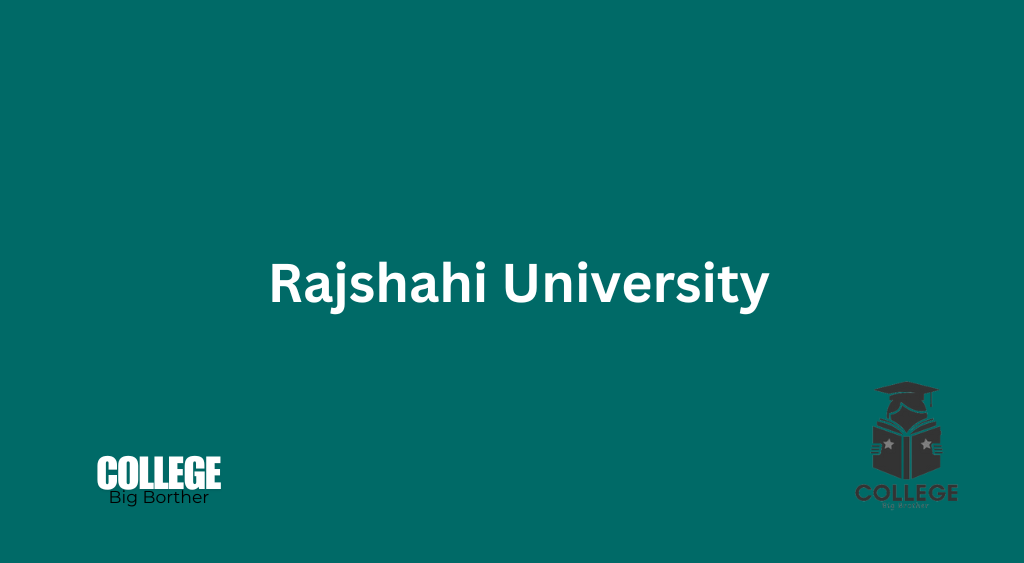
Table of Contents About Rajshahi University Rajshahi University (RU), one of Bangladesh’s premier higher education institutions, was established in 1953. Located in the serene green campus of Motihar, Rajshahi, it spans approximately 753 acres, offering a peaceful and academic-friendly environment. The university is renowned for its commitment to excellence in education, research, and cultural heritage. RU hosts 59 departments under 12 faculties, encompassing disciplines like humanities, sciences, social sciences, business studies, law, engineering, and more. It caters to around 38,000 students and has a vibrant academic community supported by distinguished faculty members. RU is equipped with modern facilities, including well-stocked libraries, laboratories, and residential halls. The university emphasizes extracurricular activities, fostering critical thinking, creativity, and leadership. Its strong focus on research and innovation contributes significantly to national development. Affordable tuition, diverse academic programs, and a welcoming campus atmosphere make RU a preferred destination for students across the country and beyond. Basic Info Official Name – University of Rajshahi Establish Year- 1953 Official Website Link – www.ru.ac.bd Official Facebook Link- Address – Shahid Syed Nazrul Islam Administration Building University of Rajshahi, Rajshahi 6205, Bangladesh Rajshahi University Faculties and Departments Here is a table of the faculties and departments at Rajshahi University (RU): Faculty Departments Faculty of Arts Bengali, English, History, Philosophy, Islamic History and Culture, Arabic, Urdu, Sanskrit, Music, Theatre, and Folklore Studies Faculty of Science Physics, Chemistry, Mathematics, Statistics, Biochemistry and Molecular Biology, Genetic Engineering and Biotechnology, Geography and Environmental Studies, Computer Science and Engineering Faculty of Social Sciences Economics, Political Science, Sociology, Social Work, Mass Communication and Journalism, Public Administration, Anthropology Faculty of Business Studies Accounting and Information Systems, Finance, Banking and Insurance, Marketing, Management Studies Faculty of Law Law Faculty of Agriculture Agronomy, Crop Science and Technology, Fisheries, Soil Science, Entomology, Horticulture, Veterinary Science Faculty of Life and Earth Sciences Botany, Zoology, Psychology, Genetic Engineering, Microbiology, Geology, Fisheries Faculty of Engineering Information and Communication Engineering (ICE), Applied Physics and Electronic Engineering (APEE) Faculty of Medicine Affiliated medical colleges in the Rajshahi region Faculty of Fine Arts Painting, Sculpture, Crafts, Graphics, Oriental Arts Faculty of Education Education and Educational Psychology Institutes at RU: Institute Institute of Biological Sciences Institute of Business Administration (IBA) Institute of Environmental Science Institute of Education and Research Institute of Bangladesh Studies Rajshahi University is recognized for its diversity in academic disciplines, making it a hub of excellence in education and research. Rajshahi University Courses, Duration and Fees Here is an overview of Rajshahi University (RU) courses, duration, and approximate fees: Undergraduate Programs Faculty Program/Course Duration Approx. Fees (BDT) (Per Year) Faculty of Arts BA in Bengali, English, History, Philosophy, etc. 4 years 8,000 – 15,000 Faculty of Science BSc in Physics, Chemistry, Mathematics, etc. 4 years 12,000 – 20,000 Faculty of Social Sciences BSS in Economics, Sociology, Public Administration 4 years 8,000 – 15,000 Faculty of Business Studies BBA in Accounting, Finance, Marketing, Management 4 years 15,000 – 30,000 Faculty of Law LLB 4 years 10,000 – 20,000 Faculty of Agriculture BSc in Agronomy, Crop Science, Fisheries, etc. 4 years 15,000 – 25,000 Faculty of Life and Earth Sciences BSc in Botany, Zoology, Geology, etc. 4 years 12,000 – 20,000 Faculty of Engineering BSc in ICE, APEE 4 years 25,000 – 40,000 Faculty of Fine Arts BFA in Painting, Sculpture, Oriental Art 4 years 8,000 – 15,000 Postgraduate Programs Faculty Program/Course Duration Approx. Fees (BDT) (Per Year) Faculty of Arts MA in Bengali, English, History, Philosophy, etc. 1-2 years 10,000 – 15,000 Faculty of Science MSc in Physics, Chemistry, Mathematics, etc. 1-2 years 15,000 – 25,000 Faculty of Social Sciences MSS in Economics, Sociology, Public Administration 1-2 years 10,000 – 15,000 Faculty of Business Studies MBA 1.5 years 50,000 – 70,000 Faculty of Agriculture MSc in Agronomy, Crop Science, Fisheries, etc. 1-2 years 15,000 – 25,000 Faculty of Law LLM 1 year 12,000 – 20,000 Faculty of Life and Earth Sciences MSc in Botany, Zoology, Geology, etc. 1-2 years 15,000 – 25,000 Key Notes: Affordable Fees: Rajshahi University offers affordable tuition compared to private universities. Additional Costs: Admission Fee: 5,000 – 8,000 BDT (one-time). Laboratory/fieldwork fees (for science and engineering programs). Scholarships: Available for meritorious and financially disadvantaged students. International Students: Higher fees apply for non-resident students. For accurate and updated information, visit the official RU website or contact the university administration. Rajshahi University Admission Process Here is an overview of the Rajshahi University Admission Process: Step Details 1. Admission Circular – Published on the Rajshahi University (RU) website and national newspapers. – Includes details on eligibility, exam dates, and application procedures. 2. Eligibility Criteria – Minimum GPA requirements in SSC and HSC (or equivalent): – Combined GPA of 8.0+ for Science, 7.5+ for Humanities, and 7.0+ for Business Studies. 3. Online Application – Apply through the RU online admission portal. – Pay the application fee (around 1,200 – 1,500 BDT) via mobile banking or bank deposit. 4. Admission Units and Subjects – RU admissions are categorized into units based on faculties: A Unit – Science, B Unit – Arts, C Unit – Business Studies, etc. 5. Admission Test – Each unit conducts a written test and/or MCQ test on subjects relevant to the chosen faculty. – Questions include General Knowledge, English, and faculty-specific topics. 6. Merit List Publication – RU publishes merit lists based on test scores and previous academic performance. – Separate lists for quota applicants (e.g., freedom fighters, disabled students, minorities). 7. Departmental Allocation – Based on merit, students select departments within their applied unit. Allocation depends on available seats. 8. Document Verification – Submit required documents: SSC & HSC certificates, mark sheets, photos, and national ID. Documents are verified by the university. 9. Admission Fee Payment – Pay the admission and semester fees to confirm enrollment. Fees vary by program and faculty (10,000 – 30,000 BDT on average). 10. Orientation and Classes Start – Attend orientation programs organized by faculties. Classes commence as per the academic calendar. Special Notes: Quota System: Reserved seats are available for freedom fighters’ children,
BRAC University
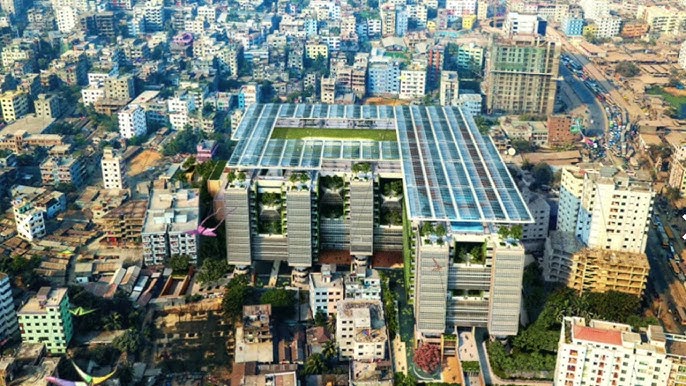
BRAC University About BRAC University BRAC University (BRACU), established in 2001, is one of Bangladesh’s leading private universities, dedicated to fostering innovation, academic excellence, and social impact. Located in Dhaka, BRACU is an initiative of BRAC, the world’s largest NGO, reflecting its commitment to education and societal development. The university offers a diverse range of undergraduate and postgraduate programs across disciplines such as business, engineering, social sciences, law, and public health. With a focus on experiential learning and research, BRACU emphasizes critical thinking, leadership, and sustainability. Its state-of-the-art campus features modern classrooms, research labs, and student-centric facilities. The university is also known for its liberal arts approach, encouraging interdisciplinary education. BRACU collaborates with global institutions, enabling students to gain international exposure through exchange programs and partnerships. With scholarships and financial aid, BRACU ensures access to quality education for deserving students, nurturing future leaders for local and global challenges. Basic Info Official Name – BRAC University Establish Year – 2001 Official Website Link – www.bracu.ac.bd Official Facebook Link- Address – Kha 224 Bir Uttam Rafiqul Islam Avenue, Merul Badda, Dhaka 1212. Bangladesh Tel: +88 09638464646 (Ext.1001 for operator) BRAC University Campus BRAC University Faculties and Departments Here is a table of the faculties and departments at BRAC University (BRACU): Faculty Departments School of Business – Department of Business Administration (BBA, MBA, EMBA) School of Data and Sciences – Department of Computer Science and Engineering (CSE) – Department of Mathematics and Natural Sciences (MNS) School of Humanities and Social Sciences – Department of English and Humanities (ENH) – Department of Economics and Social Sciences (ESS) School of Architecture and Design – Department of Architecture (ARC) School of Law – Department of Law (LLB) James P. Grant School of Public Health – Master of Public Health (MPH) BRAC Institute of Governance and Development (BIGD) – Governance and Development Studies BRAC Institute of Educational Development (BIED) – Education Studies and Development Specialized Institutes and Centers: BRAC Business School – Focuses on business leadership and management studies. Centre for Climate Change and Environmental Research (C3ER) – Research on environmental sustainability. Center for Entrepreneurship Development (CED) – Supports innovation and entrepreneurship. Center for Peace and Justice (CPJ) – Promotes social justice and human rights. BRAC University offers a multidisciplinary education approach, preparing students for global challenges. BRAC University Courses, Duration and Fees Here is an overview of the courses, duration, and approximate fees at BRAC University (BRACU): Undergraduate Programs Program Duration Approx. Total Fees (BDT) Bachelor of Business Administration (BBA) 4 years 8,00,000 – 10,00,000 BSc in Computer Science and Engineering (CSE) 4 years 8,50,000 – 10,50,000 BSc in Electrical and Electronic Engineering (EEE) 4 years 8,50,000 – 10,50,000 BA in English 4 years 7,00,000 – 8,50,000 BSS in Economics 4 years 7,50,000 – 9,00,000 Bachelor of Architecture (B.Arch) 5 years 12,00,000 – 15,00,000 LLB (Bachelor of Laws) 4 years 8,00,000 – 9,50,000 Postgraduate Programs Program Duration Approx. Total Fees (BDT) Master of Business Administration (MBA) 1.5 – 2 years 4,50,000 – 6,00,000 Executive MBA (EMBA) 1.5 – 2 years 5,00,000 – 6,50,000 Master of Public Health (MPH) 1 year 5,50,000 – 7,00,000 MA in English 1.5 – 2 years 3,50,000 – 4,50,000 MSc in Applied Economics 1.5 – 2 years 4,00,000 – 5,50,000 MSc in Computer Science and Engineering 1.5 – 2 years 4,50,000 – 5,50,000 Key Notes: Fees: Fees are subject to changes and vary slightly based on credit hours and additional charges. Tuition fees are calculated per credit hour, ranging from 6,000 – 8,000 BDT per credit. Additional Costs: Admission Fee: 25,000 – 30,000 BDT (one-time). Other charges include library, lab, and development fees. Scholarships and Financial Aid: BRACU offers need-based and merit-based scholarships covering up to 100% tuition fees. International Students: Higher tuition rates apply for international students. For accurate and updated information, refer to the official BRAC University website. BRAC University Admission Process Here is an overview of the BRAC University (BRACU) Admission Process: Step Details 1. Admission Circular – Admission notices are published on the BRAC University website and in newspapers. 2. Eligibility Criteria – Undergraduate Programs: – Minimum GPA of 4.0+ in SSC and HSC (or equivalent). – Science programs (CSE/EEE): Must have Mathematics and Physics in HSC. – English Proficiency: IELTS (5.5+) or TOEFL scores are advantageous. – Postgraduate Programs: Relevant undergraduate degree with a minimum CGPA of 2.5 or equivalent. 3. Online Application – Apply via the BRAC University Online Admission Portal. – Upload required documents: academic certificates, transcripts, recent photos, and NID. – Pay the application fee of 1,500 – 2,000 BDT through mobile banking or bank deposit. 4. Admission Test – Candidates must appear for a written admission test covering English, Mathematics, and Logical Reasoning. – For postgraduate programs, there may be interviews or specific subject-based evaluations. 5. Merit List Publication – Merit lists are published based on test scores and academic performance. – Quota-based admission is available for selected groups (e.g., freedom fighters’ children). 6. Document Verification – Original copies of SSC, HSC certificates, mark sheets, and national ID must be verified by the university. 7. Admission Confirmation – Pay the admission fee (approximately 25,000 – 30,000 BDT) to confirm enrollment. – Submit all verified documents, and receive a student ID card. 8. Orientation and Class Start – Participate in an orientation session to understand university rules, resources, and facilities. Classes commence as per the academic calendar. Key Notes: International Applicants: Must provide equivalence certificates for foreign qualifications. Higher tuition fees may apply. Scholarships and Financial Aid: Merit-based and need-based scholarships covering up to 100% of tuition fees are available. Students with exceptional HSC results or admission test performance are prioritized. Special Programs: Foundation courses are provided for students who need to improve their English or Mathematics skills. For the latest updates, visit the official BRAC University website. BRAC University Campus Facilities Library Laboratories Hostel Computer Lab Auditorium Play Ground Medical Cultural Green Environment Transport Key Points BRAC University Admission FAQs BRAC University Admission Item #1 Table of Contents Related Post
Dhaka University | du.ac.bd
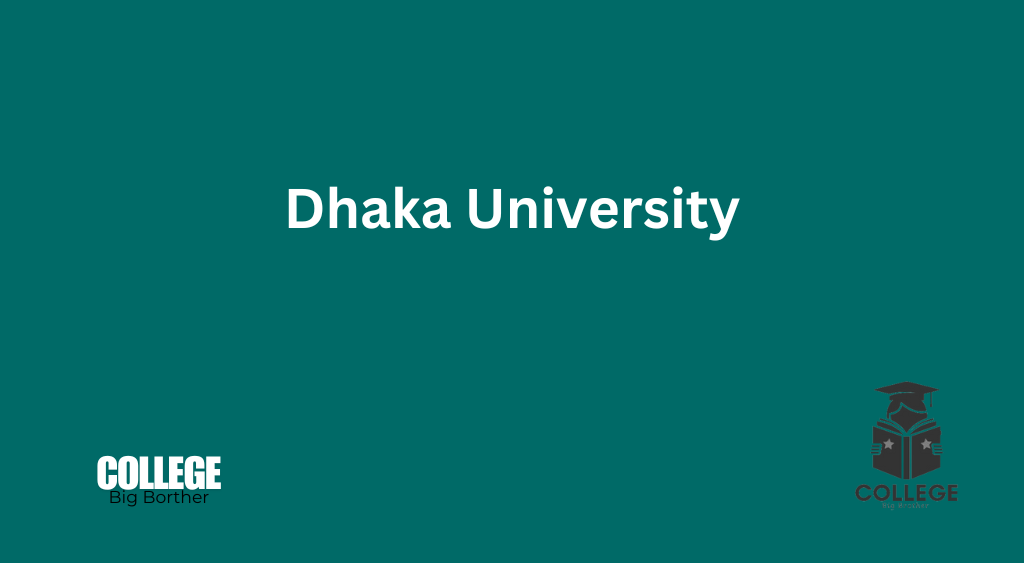
About Dhaka University The University of Dhaka (DU), established in 1921, is the oldest and most prestigious university in Bangladesh. Located in the heart of Dhaka, it is often referred to as the “Oxford of the East” for its rich history and academic excellence. DU offers undergraduate, postgraduate, and doctoral programs across disciplines such as arts, sciences, commerce, law, and medicine. The university has played a pivotal role in shaping the nation’s history, serving as a hub for intellectual and political movements, including the Language Movement of 1952 and the Liberation War of 1971. Its sprawling campus houses over 40,000 students and numerous state-of-the-art facilities. DU is also renowned for its vibrant cultural and extracurricular activities, fostering critical thinking and leadership among students. As a symbol of academic heritage, it continues to contribute significantly to education, research, and nation-building in Bangladesh. Table of Contents Basic Info Official Name – University of Dhaka Establish Year- 1921 Official Website Link – www.du.ac.bd Official Facebook Link- Address – Dhaka, Bangladesh Dhaka University Faculties and Departments Here is a table format of Dhaka University Faculties and Departments: Faculty Departments Faculty of Arts Bengali, English, History, Philosophy, Islamic Studies, Arabic, Persian, Urdu, Sanskrit, Pali, Linguistics, Theatre and Performance Studies, Music Faculty of Science Physics, Chemistry, Mathematics, Statistics, Biochemistry and Molecular Biology, Genetic Engineering and Biotechnology, Microbiology, Theoretical Physics Faculty of Social Sciences Economics, Sociology, Political Science, Public Administration, International Relations, Mass Communication and Journalism, Anthropology, Women and Gender Studies, Peace and Conflict Studies, Development Studies Faculty of Business Studies Accounting and Information Systems, Finance, Marketing, Management Studies, International Business, Banking and Insurance, Tourism and Hospitality Management, Management Information Systems (MIS) Faculty of Biological Sciences Botany, Zoology, Psychology, Fisheries, Soil, Water, and Environment, Biochemistry and Molecular Biology, Genetic Engineering and Biotechnology, Microbiology Faculty of Law Law Faculty of Earth and Environmental Sciences Geography and Environment, Geology, Oceanography, Disaster Science and Management Faculty of Engineering and Technology Electrical and Electronic Engineering, Computer Science and Engineering, Applied Chemistry and Chemical Engineering, Nuclear Engineering, Robotics and Mechatronics Engineering Faculty of Medicine Public Health, Pharmacology and Biostatistics (affiliated medical colleges included) Faculty of Pharmacy Pharmacy Faculty of Fine Arts Drawing and Painting, Graphic Design, Printmaking, Ceramics, Sculpture, Craft, Oriental Art, History of Art Faculty of Education Educational and Counseling Psychology, Curriculum and Instruction, Educational Research Faculty of Postgraduate Medical Sciences and Research Medical Research, Biomedical Sciences Institutes (Under Various Faculties) Institutes Institute of Business Administration (IBA) Institute of Education and Research (IER) Institute of Statistical Research and Training (ISRT) Institute of Social Welfare and Research Institute of Modern Languages (IML) Institute of Information Technology (IIT) This table captures Dhaka University’s wide range of faculties and departments, showcasing its academic diversity. For more details, visit the official DU website. Dhaka University Courses, Duration and Fees Here is an overview of Dhaka University (DU) courses, duration, and approximate fees: Undergraduate Programs Faculty Program/Course Duration Approx. Fees (BDT) (Per Year) Arts BA in Bengali, English, History, Philosophy, etc. 4 years 10,000 – 15,000 Science BSc in Physics, Chemistry, Mathematics, etc. 4 years 12,000 – 20,000 Social Sciences BSS in Economics, Sociology, Political Science, etc. 4 years 10,000 – 15,000 Business Studies BBA in Accounting, Finance, Marketing, etc. 4 years 15,000 – 25,000 Biological Sciences BSc in Botany, Zoology, Psychology, etc. 4 years 12,000 – 20,000 Engineering and Technology BSc in CSE, EEE, Nuclear Engineering, etc. 4 years 20,000 – 40,000 Pharmacy BPharm 4 years 25,000 – 35,000 Fine Arts BFA in Drawing and Painting, Graphic Design, etc. 4 years 10,000 – 20,000 Law LLB 4 years 12,000 – 20,000 Postgraduate Programs Faculty Program/Course Duration Approx. Fees (BDT) (Per Year) Arts MA in Bengali, English, History, etc. 1-2 years 12,000 – 20,000 Science MSc in Physics, Chemistry, Mathematics, etc. 1-2 years 15,000 – 25,000 Social Sciences MSS in Economics, Sociology, Political Science, etc. 1-2 years 12,000 – 20,000 Business Studies MBA 1.5 years 50,000 – 100,000 (IBA) Biological Sciences MSc in Botany, Zoology, Psychology, etc. 1-2 years 15,000 – 25,000 Engineering and Technology MSc in CSE, EEE, Nuclear Engineering, etc. 1-2 years 25,000 – 40,000 Pharmacy MPharm 1-2 years 30,000 – 40,000 Law LLM 1 year 15,000 – 20,000 Key Notes Affordable Fees: Dhaka University offers quality education at an affordable cost compared to private universities. Additional Costs: Admission fee (one-time): 5,000 – 10,000 BDT. Laboratory and fieldwork fees (for Science programs). Scholarships: Available for students with financial needs or excellent academic performance. International Students: Fees are generally higher for non-resident students. For the most accurate and updated information, visit the official DU website or contact the respective departments. Dhaka University Admission Process Here is the Dhaka University Admission Process in a table format: Step Details 1. Admission Circular – Published on the DU website and newspapers. – Includes details on eligibility, test dates, and application procedure. 2. Eligibility Criteria – Minimum GPA in SSC and HSC (combined 8.0 for Science, 7.5 for Arts, and 7.0 for Business Studies). – Subject-specific requirements for certain faculties. 3. Online Application – Apply through the official DU admission portal. – Pay the application fee (650-1,000 BDT) via mobile banking or bank deposit. 4. Admission Test Registration – Register for admission tests for specific units (A, B, C, D, and E). – Units correspond to faculties: A – Science, B – Arts, C – Business Studies, D – Social Sciences, E – Fine Arts. 5. Admission Test – Written and/or MCQ-based test depending on the unit. – Subjects include General Knowledge, English, and unit-specific topics. 6. Merit List Publication – Merit lists are published based on test scores and SSC/HSC performance. – Separate merit lists for quotas (e.g., freedom fighters, tribal groups). 7. Counseling and Department Allocation – Shortlisted candidates attend counseling to select departments based on merit and available seats. 8. Document Verification – Submit original academic documents (SSC & HSC certificates, mark sheets, photos, and other required documents) for verification. 9. Admission Fee Payment – Pay the admission fee to confirm enrollment. Fee varies by